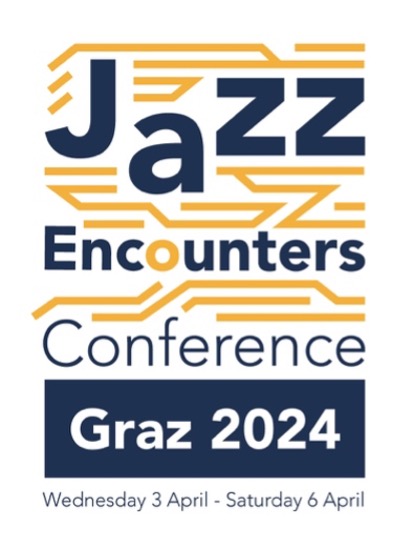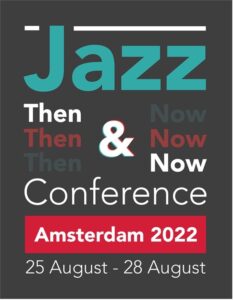 The eighth Rhythm Changes Conference, Jazz Encounters, will take place at the Institute for Jazz Research (University of Music and Performing Arts, Graz, Austria) from 3 to 6 April 2024. This conference is organised in conjunction with the fourteenth International Jazz Research Conference.
The eighth Rhythm Changes Conference, Jazz Encounters, will take place at the Institute for Jazz Research (University of Music and Performing Arts, Graz, Austria) from 3 to 6 April 2024. This conference is organised in conjunction with the fourteenth International Jazz Research Conference.
Keynotes
- Keynote: Prof. George McKay (University of East Anglia, UK)
- Keynote: Maite Hontelé (trumpet player, the Netherlands)
- Closing address: Stephanie Vos (Stellenbosch University, South Africa)
We invite submissions for Jazz Encounters, a four-day multidisciplinary conference bringing together researchers, writers, musicians, critics, and others interested in jazz studies. The event will feature academic papers and panels.
Jazz is a music born of encounter. Jazz encounters are dynamic; they create synergies and frictions and have the power to reconfigure social and political spheres. To understand these encounters is to understand ongoing processes of identity-making and the history and meaning of jazz in the world. Jazz encounters have arisen from and are influenced by myriad factors, including histories and legacies of enslavement, cultural and creative exchanges, ideological contestation, technological change, new modes of communication, economic development, trade, war, occupation, and political consolidation. These processes of encounter and migration – of people, ideas, goods, and objects – shape understandings of the music and its impact on society, from the influence on the lives of individuals to the ideology of societal institutions.
We welcome papers addressing the conference theme from multiple perspectives, including cultural studies, musicology, cultural theory, music analysis, jazz history, media studies, and practice-based research. We particularly welcome contributors who identify as women or gender diverse and from other under-represented groups and communities within jazz studies and academia more generally. Within the general theme of Jazz Encounters, we have identified several sub-themes. Where relevant, please clearly specify which sub-theme you are referring to in your proposal.
Gendered Encounters
Gender has shaped every aspect of jazz, from social interactions between practitioners to how different gendered experiences affect and reproduce understandings of and participation in jazz cultures. This strand aims to challenge established gender narratives in jazz by deconstructing exclusionary, binary, cis-normative, and male-dominated models of practice and interaction. We invite papers investigating social inclusion, diversity, and gender roles in various aesthetic, performative, social and political contexts, including the role of gatekeepers and the relevance of intersectional power relations across multiple career stages. We furthermore welcome investigations that propose new paradigms for evaluating musical experiences. This strand was developed in collaboration with the Centre for Gender Studies and Diversity, University of Music and Performing Arts Graz.
Jazz in Times of Crisis
Jazz has often been created and experienced amid a sense of crisis, be it personal, organisational, economic, social, or political. Whilst crises can cause anxiety and distress, they can also serve as catalysts for change, resulting in creative actions, innovations, and reflections on existing practices. Equally, jazz has often been described as a music in crisis, generating hyperbolic writings that highlight an existential threat to the art form or the precarity of the music as a cultural practice. Within this strand, topics could include reflections on jazz in crisis, its relationship to war, the climate emergency, post-pandemic responses, economic crises, forced migration, and political extremism.
Well-being
The relationship between jazz practices and their impact (both negative and positive) on well-being is rarely discussed, and yet, such explorations are needed now more than ever. Particularly since claims of jazz’s societal value and transformative potential are often made without evidence, and the mental and physical health of those involved in jazz is rarely considered. We are interested in evidence-based interventions that help gain a deeper understanding of jazz and well-being to better support the music in the future and to make improvements that are sustainable for different groups. Subjects for consideration may include jazz and mental health, disability, ageing, social inequalities, environmental challenges, working conditions, economic welfare, and work-life balance.
Digital Encounters
Digital technologies give rise to powerful new forms of communication and new ways of acquiring knowledge and distributing information. They transform cultural values and identities by enabling novel types of connectedness and amplifying social divisions and differences. Jazz has embraced and arguably sometimes resisted the transformative potential of the digital. This strand aims to help us consider how digital technologies have brought about social and cultural changes in jazz and how those changes have been influenced by society and culture. We are particularly interested in discussions of VR, XR, and AI and their impact on jazz cultures and practices, alongside broader discussions of the digital revolution in music, from recording technologies to live performance to social media.
People and Places
There are strong links between music, senses of place, and people’s social and cultural identities, including race, ethnicity, class, and gender. From the evocative symbolism of Ellington’s ‘Harlem’ to the images of the post-industrial landscapes invoked by DJ Spooky, jazz has played an important role in the narrativisation of place. It has been central to how individuals and groups have defined their relationship to local, everyday contexts, as well as disrupting or even erasing those connections and challenging assumptions about homelands and origins. In this strand, we invite papers that map the relationship between music, place, and people, whether past, present, or future. We welcome discussions of scenes, communities, and networks from the perspective of placemaking, and belonging, memorialisation, and the imaginary.
Further information
Please submit your proposal (max. 250 words), including a short biography (max. 50 words) and institutional affiliation, as a Word document to Christa Bruckner-Haring (Conference director): rhythmchanges@kug.ac.at.
The deadline for proposals is 15 September 2023; we will communicate outcomes to authors by mid-October 2023. The conference committee comprises Christa Bruckner-Haring, Christa Brüstle, André Doehring, Nicholas Gebhardt, George McKay, Sarah Raine, Loes Rusch, Walter van de Leur, and Tony Whyton.
Jazz Encounters is hosted by the Institute for Jazz Research and the Center for Gender Studies and Diversity at the University of Music and Performing Arts Graz in cooperation with the International Society for Jazz Research. It continues to build on the legacy of the research project Rhythm Changes: Jazz Cultures and European Identities (2010–2013), funded as part of the Humanities in the European Research Area (HERA) Joint Research Programme. In the spirit of Rhythm Changes, the project team continues to develop networking opportunities and champion collaborative research in transnational jazz studies.
Updates on the conference will be available on the Institute for Jazz Research website, here on the Rhythm Changes website, Facebook, and X.
To register, click here. Early bird fee valid until 4 Feb.

 The seventh Rhythm Changes conference: Jazz Now! will take place at the
The seventh Rhythm Changes conference: Jazz Now! will take place at the 

 The organising committee met at Amsterdam Conservatory in late September 2016 to reflect on the Birmingham conference at Easter, and to discuss the theme and call for papers for our 2017 conference… Announcement imminent, but do note the 2017 dates below! The committee consists of (L-R in photo) Dr Loes Rusch (BCU), Dr Christa-Bruckner-Haring (Graz), Prof Tony Whyton (BCU), Prof Nick Gebhardt (BCU), Prof Walter van de Leur (Amsterdam) and ace photographer Prof George McKay (UEA).
The organising committee met at Amsterdam Conservatory in late September 2016 to reflect on the Birmingham conference at Easter, and to discuss the theme and call for papers for our 2017 conference… Announcement imminent, but do note the 2017 dates below! The committee consists of (L-R in photo) Dr Loes Rusch (BCU), Dr Christa-Bruckner-Haring (Graz), Prof Tony Whyton (BCU), Prof Nick Gebhardt (BCU), Prof Walter van de Leur (Amsterdam) and ace photographer Prof George McKay (UEA).
























